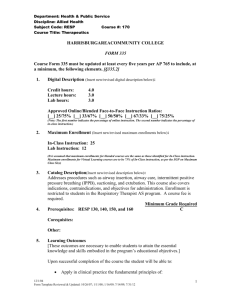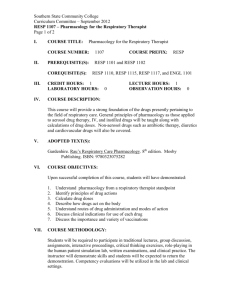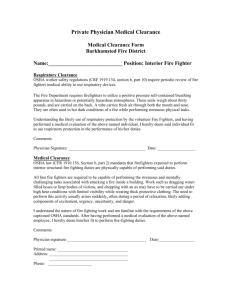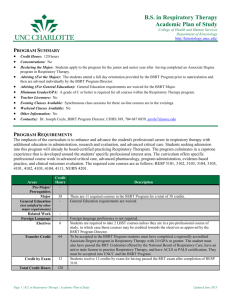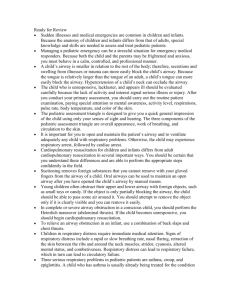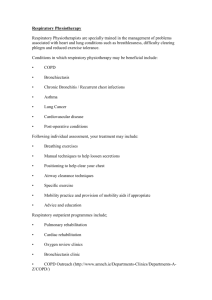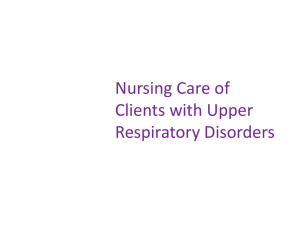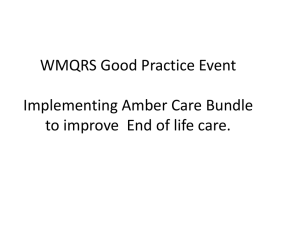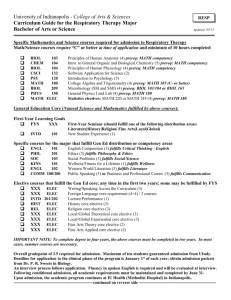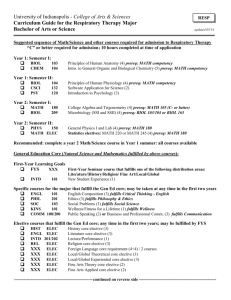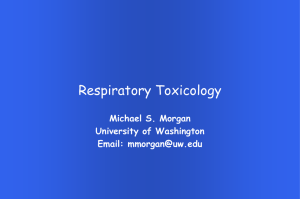RESP 1110 - Respiratory Therapeutics
advertisement
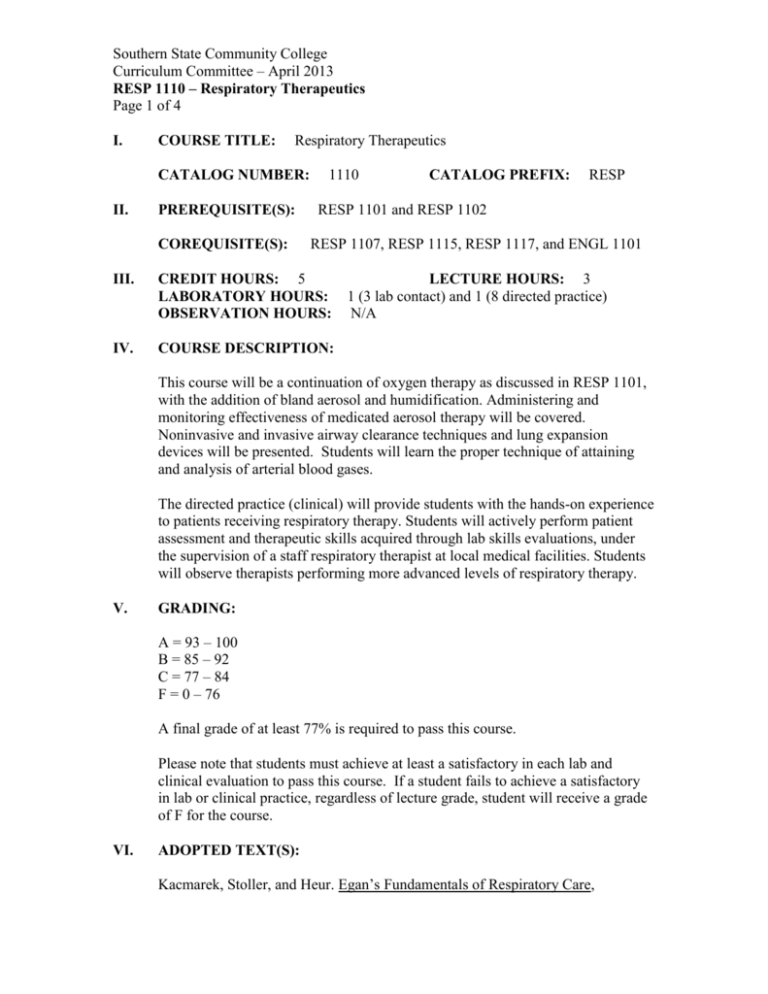
Southern State Community College Curriculum Committee – April 2013 RESP 1110 – Respiratory Therapeutics Page 1 of 4 I. COURSE TITLE: Respiratory Therapeutics CATALOG NUMBER: II. PREREQUISITE(S): COREQUISITE(S): 1110 CATALOG PREFIX: RESP RESP 1101 and RESP 1102 RESP 1107, RESP 1115, RESP 1117, and ENGL 1101 III. CREDIT HOURS: 5 LABORATORY HOURS: OBSERVATION HOURS: IV. COURSE DESCRIPTION: LECTURE HOURS: 3 1 (3 lab contact) and 1 (8 directed practice) N/A This course will be a continuation of oxygen therapy as discussed in RESP 1101, with the addition of bland aerosol and humidification. Administering and monitoring effectiveness of medicated aerosol therapy will be covered. Noninvasive and invasive airway clearance techniques and lung expansion devices will be presented. Students will learn the proper technique of attaining and analysis of arterial blood gases. The directed practice (clinical) will provide students with the hands-on experience to patients receiving respiratory therapy. Students will actively perform patient assessment and therapeutic skills acquired through lab skills evaluations, under the supervision of a staff respiratory therapist at local medical facilities. Students will observe therapists performing more advanced levels of respiratory therapy. V. GRADING: A = 93 – 100 B = 85 – 92 C = 77 – 84 F = 0 – 76 A final grade of at least 77% is required to pass this course. Please note that students must achieve at least a satisfactory in each lab and clinical evaluation to pass this course. If a student fails to achieve a satisfactory in lab or clinical practice, regardless of lecture grade, student will receive a grade of F for the course. VI. ADOPTED TEXT(S): Kacmarek, Stoller, and Heur. Egan’s Fundamentals of Respiratory Care, RESP 1110 – Respiratory Therapeutics Page 2 of 4 10th edition. Mosby Publishing. ISBN: 978-0-323-08203-7 Wehrman. Workbook for Egan’s Fundamentals of Respiratory Care, 10th edition. Mosby Publishing. ISBN: 978-0-323-08202-0 VII. COURSE OBJECTIVES: Upon successful completion of the lecture and lab portions of the course, the student will have demonstrated: 1. Identify and apply the appropriate bland aerosol and humidification therapy 2. Understand principles of aerosolized medications 3. Demonstrate and explain the various methods of administering aerosolized medications 4. Recognize indications and contraindications of respiratory medications 5. Identify and demonstrate proper airway clearance and pulmonary hygiene techniques 6. Performing invasive airway clearance 7. Obtaining and analyzing arterial blood gases 8. Assembling, usage, and troubleshooting of lung expansion devices 9. Recognizing various artificial airways- insertion and removal of each Upon successful completion of the directed practice portion of the course, the student will have demonstrated: 1. A continuance of all Course Objectives required within RESP 1101 2. Noninvasive techniques of bronchial hygiene 3. Invasive techniques of airway clearance 4. Proper techniques of obtaining arterial blood gases 5. Analysis of arterial blood gas results 6. Proper assembly, usage, and troubleshooting of lung expansion devices 7. Proper technique in preparing for and performing the insertion and removal of artificial airways VIII. COURSE METHODOLOGY: Students will be required to participate in traditional lectures, group discussions, assignments, interactive proceedings, critical thinking exercises, role-playing in the human patient simulation lab, written examinations, and clinical practice. The instructor will demonstrate skills and students will be expected to return the demonstration. Competency evaluations will be utilized in the lab and clinical settings. IX. COURSE OUTLINE: Bland Aerosol and Humidification Therapy Aerosolized Medications Airway Clearance and Bronchial Hygiene RESP 1110 – Respiratory Therapeutics Page 3 of 4 Invasive Airway Clearance (Nasotracheal Suctioning) Arterial Blood Gases Lung Expansion Devices Artificial Airways Sample ScheduleWeek 1- Bland Aerosol Therapy Week 2- Humidification Therapy Week 3- Aerosolized Medication- small volume nebulizer, MDI, DPI, and large volume nebulizer *TEST #1* Week 4- Aerosolized Medication (continued) HPS Lab at CENTRAL CAMPUS Week 5- Patient Assessment/Therapist Driven Protocols for all aerosol therapy Week 6- Bronchial Hygiene Week 7- Bronchial Hygiene (continued) Week 8- Bronchial Hygiene (continued) *TEST #2* Week 9- Invasive Airway Clearance- nasopharyngeal airway and nasotracheal suctioning Week 10- Invasive Airway Clearance (continued) Week 11- Lung Expansion Therapy HPS Lab at Central Campus Week 12- Lung Expansion Therapy (continued) *TEST #3* Week 13- Arterial Blood Gases Week 14- Arterial Blood Gases (continued) *TEST #4* Artificial Airways Week 15- Artificial Airways (continued) Finals Week- *Comprehensive Final Exam* The schedule is subject to change according to availability of guest speakers throughout the quarter and length of class discussion. X. OTHER REQUIRED TEXTS, SOFTWARE AND MATERIALS: Stethoscope, wrist watch with a secondhand, scissors, and calculator. Recommended textbook: Cairo, J.M. Mosby’s Respiratory Care Equipment. 9th edition Elsevier (Mosby) Publishing. ISBN: 978-0-323-09621-8 The approved uniform includes the following: a. Female students: royal blue professional uniform (scrubs), white socks, clean white tennis shoes, and photo ID badge RESP 1110 – Respiratory Therapeutics Page 4 of 4 b. Male students: XI. royal blue professional uniform (scrubs), white socks, clean white tennis shoes, and photo ID badge EVALUATION: Knowledge is evaluated through written examinations, quizzes, workbook and exercises, as determined by the instructor. Additional specific evaluation requirements and the respective point values will be provided on the first day of class. Clinical practice is evaluated by student knowledge and application of that knowledge in the clinical setting. Students are to demonstrate progress toward course objectives as evidenced by specific behaviors noted in the clinical evaluation tool for this course. XII. SPECIFIC MANAGEMENT REQUIREMENTS: None XIII. OTHER INFORMATION: FERPA: Students need to understand that your work may be seen by others. Others may see your work when being distributed, during group project work, or if it is chosen for demonstration purposes. Students also need to know that there is a strong possibility that your work may be submitted to other entities for the purpose of plagiarism checks. DISABILITIES: Students with disabilities may contact the Disabilities Service Office, Central Campus, at 800-628-7722 or 937-393-3431.
